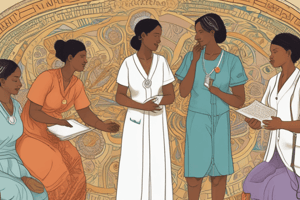Podcast
Questions and Answers
What is the primary focus of determining important information to collect during patient assessment?
What is the primary focus of determining important information to collect during patient assessment?
Which action best exemplifies scanning the environment during a patient assessment?
Which action best exemplifies scanning the environment during a patient assessment?
In the context of identifying signs and symptoms, what is a sign?
In the context of identifying signs and symptoms, what is a sign?
What is the goal of assessing systematically and comprehensively?
What is the goal of assessing systematically and comprehensively?
Signup and view all the answers
Why is it important to ensure accurate information during patient assessment?
Why is it important to ensure accurate information during patient assessment?
Signup and view all the answers
Which of the following actions should be taken to ensure accurate information in vital signs readings?
Which of the following actions should be taken to ensure accurate information in vital signs readings?
Signup and view all the answers
Which practice is essential when identifying both signs and symptoms in patients?
Which practice is essential when identifying both signs and symptoms in patients?
Signup and view all the answers
What is the practical application of scanning the environment for nurses?
What is the practical application of scanning the environment for nurses?
Signup and view all the answers
Study Notes
Getting the Information
-
Key Competencies:
- Determining important information to collect
- Scanning the environment
- Identifying signs and symptoms
- Assessing systematically and comprehensively
- Ensuring accurate information
Determining Important Information to Collect
- Nurses analyze patient data to determine what's critical for care planning and monitoring.
- Prioritization example: Post-op diabetic patient needing close monitoring of blood sugar, blood pressure, and wound status.
- Focus on data directly affecting patient safety and health.
Scanning the Environment
- Checking surroundings for safety hazards or factors affecting patient care.
- Examples: Identifying tripping hazards in a patient's room or unusual alarms on monitoring equipment.
- Regularly scan both patient rooms and communal spaces.
Identifying Signs and Symptoms
- Recognizing objective (signs) and subjective (symptoms) data to understand a patient's health status.
- Examples: Observing pallor (sign) or listening to a patient report nausea (symptom).
- Compare current signs and symptoms to baseline data or typical presentations.
Assessing Systematically and Comprehensively
- Conducting a thorough, organized assessment covering all relevant systems or areas.
- Example: Performing a head-to-toe assessment post-surgery to identify any complications.
- Use structured approaches (like SBAR) and follow up on unusual findings for a complete overview.
Ensuring Accurate Information
- Confirming all collected data is accurate and reliable.
- Example: Double-check a blood pressure reading with a different cuff if the initial reading seems inaccurate.
- Always verify unusual data points, calibrate equipment, and cross-check with patient history or other data sources.
Studying That Suits You
Use AI to generate personalized quizzes and flashcards to suit your learning preferences.




